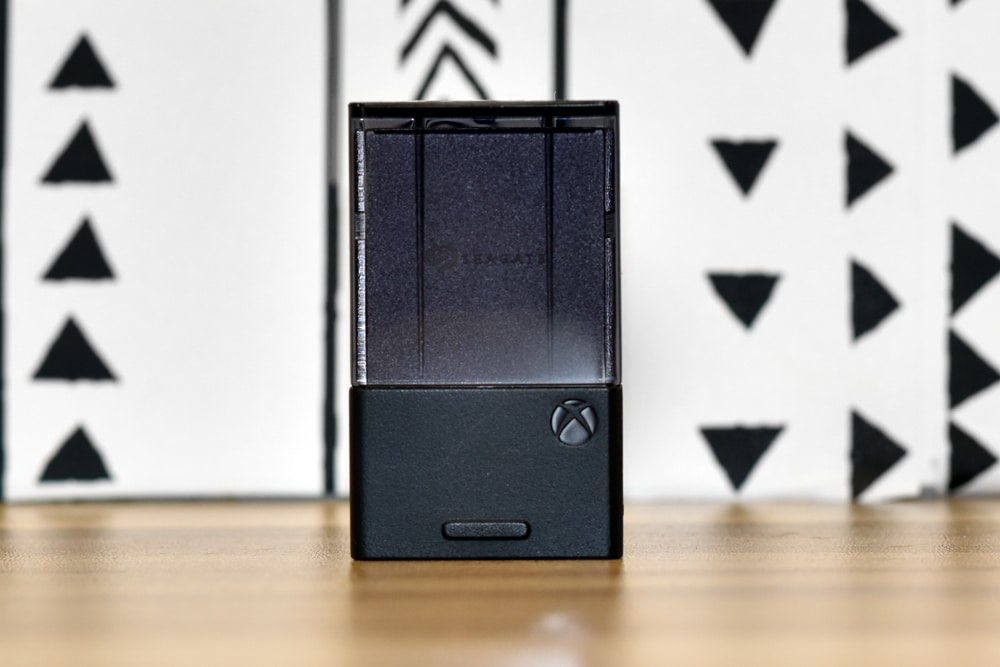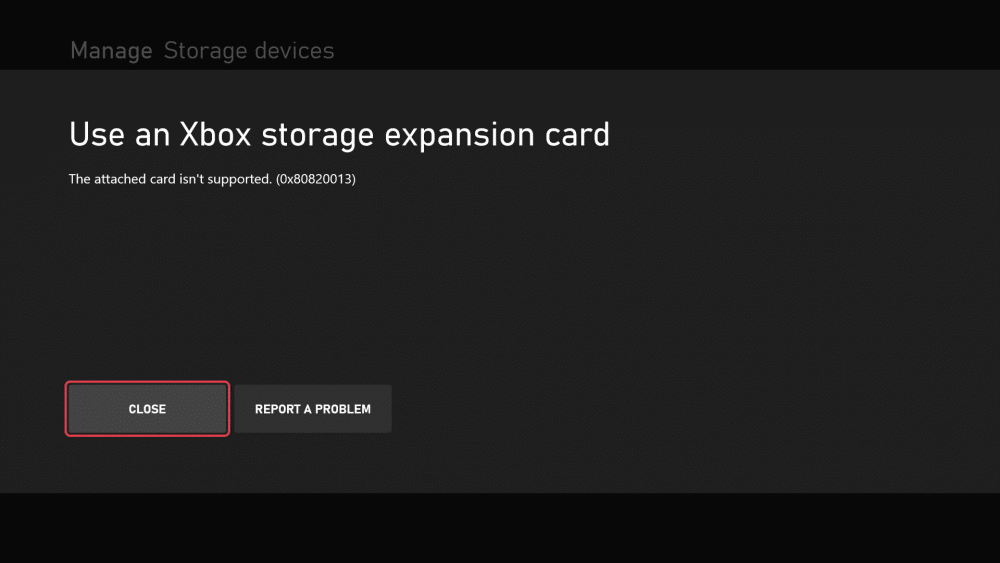The latest generation of consoles are out…sort of. If you can find an Xbox Series X or S, you are lucky. Our lab director was able to score one much to the chagrin of the rest of the lab (no worries, we’ve been putting laxatives in his coffee). The new Xbox series X|S comes with amazing performance numbers and either 1TB or 512GB of NVMe SSD storage. But with more games comes more storage needs, and Seagate is swooping with its Seagate Storage Expansion Card for Xbox Series X|S for a solution.
The latest generation of consoles are out…sort of. If you can find an Xbox Series X or S, you are lucky. Our lab director was able to score one much to the chagrin of the rest of the lab (no worries, we’ve been putting laxatives in his coffee). The new Xbox series X|S comes with amazing performance numbers and either 1TB or 512GB of NVMe SSD storage. But with more games comes more storage needs, and Seagate is swooping with its Seagate Storage Expansion Card for Xbox Series X|S for a solution.
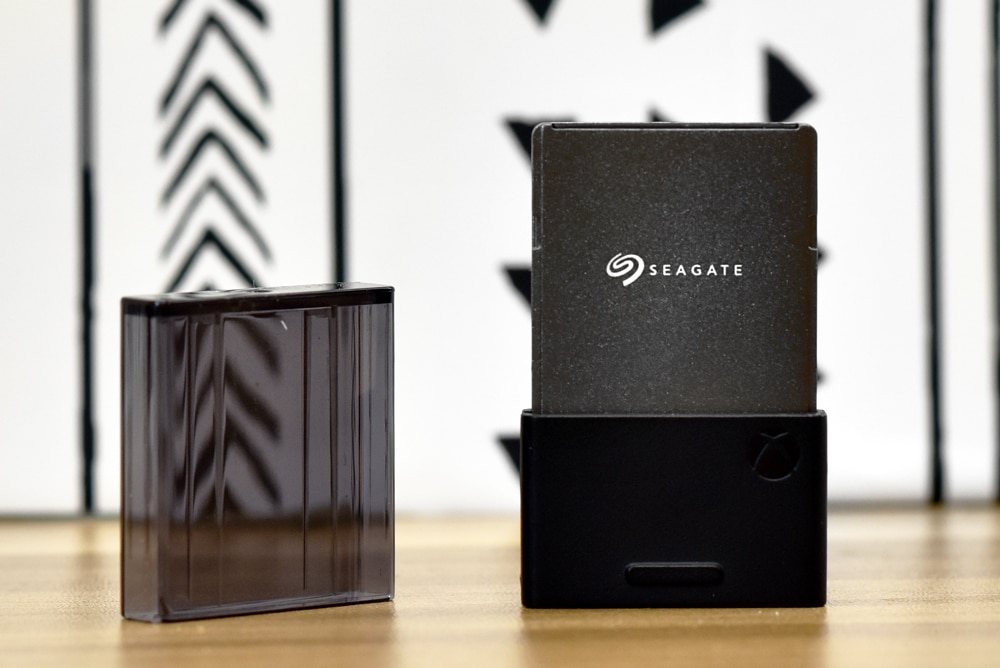
With each generation of console, the games get more complicated and take up more storage. With the slow shift to all digital games, even more capacity is going to get eaten up (though optical drive games didn’t really save gamers much space). Things like Xbox Game Pass offers gamers 100’s of titles to play per month for a small fee, again, gobbling up capacity. There are tons of external storage options that have worked for previous-gen consoles, Seagate sells several. The problem with the latest Xbox, or more specifically its Xbox Series X and Series S Optimized games, needs the same high-speed storage as the internal drive for optimal play, though they can still be stored on USB 3.1 devices.
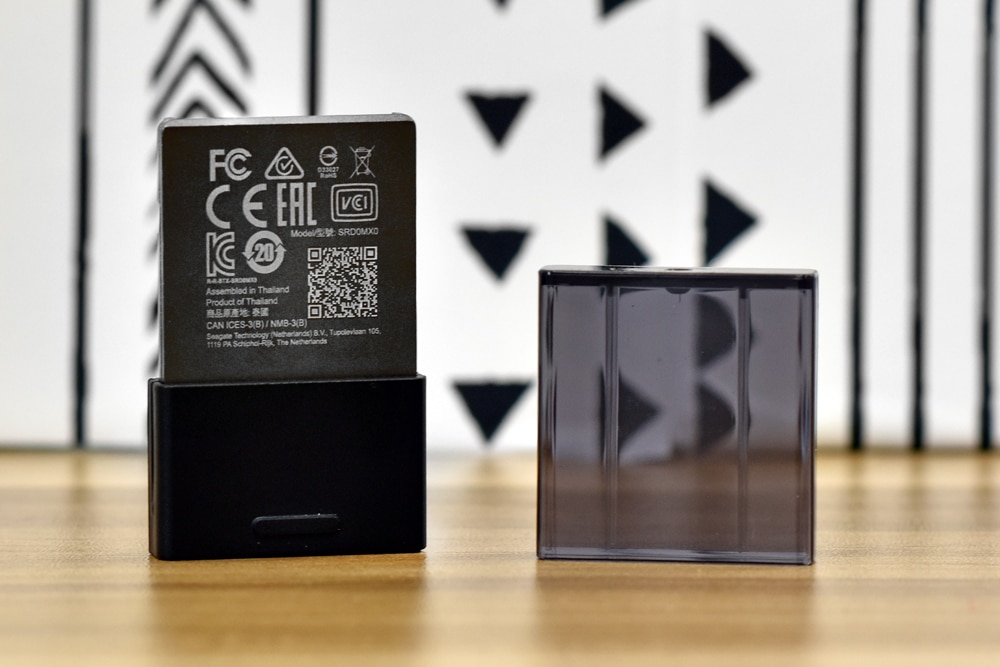
Seagate is the first, and currently only, storage vendor to partner with Xbox to deliver extra capacity for its 5th generation console that allows for the newest games to be played optimally. The expansion card comes in 1TB of capacity, doubling the higher-end Xbox X. Both companies claim the expansion card can seamlessly integrate into Xbox Velocity Architecture hitting faster load times, richer environments, and more immersive gameplay.
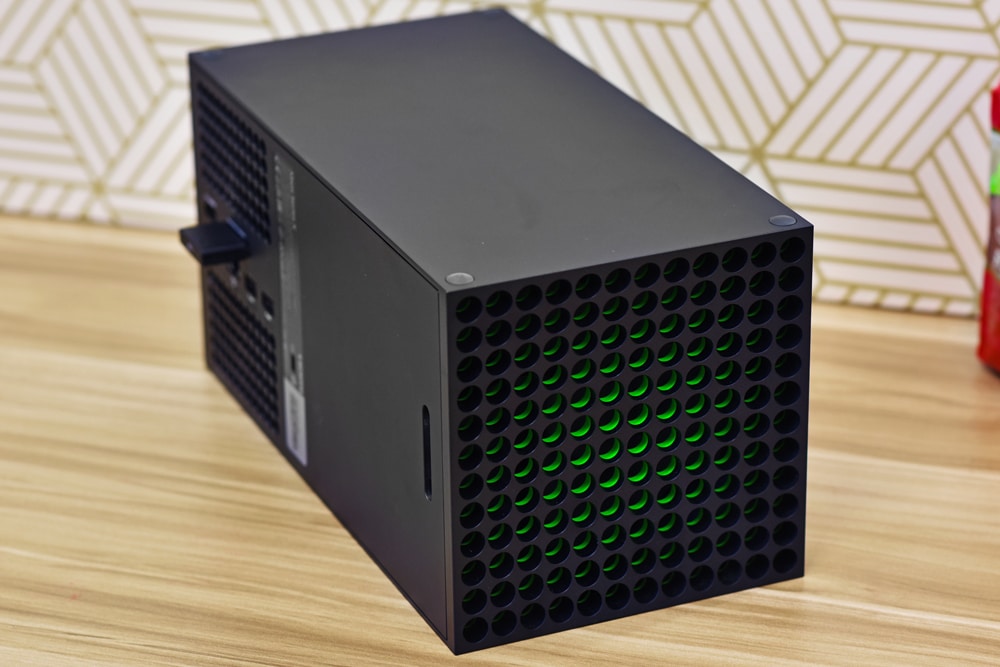
Seagate states that users will see virtually no lag in power or speed while using the expansion card. Users can leverage quick resume to instantly start where they left off from multiple titles the same as they would through the internal SSD.
The Seagate Storage Expansion Card for Xbox Series X|S currently comes in 1TB and can be picked up for $220.
Seagate Storage Expansion Card for Xbox Series X|S Specifications
| Capacity | 1TB |
| Flash Memory | Custom PCIe Gen4x2 NVMe |
| Form Factor | Xbox Series X|S Storage Expansion Card |
| Limited Warranty | 3 years |
Seagate Storage Expansion Card for Xbox Series X|S Design and Build
A little larger than a USB thumb drive, the Seagate Storage Expansion Card for Xbox Series X|S connects to a dedicated rear port on both consoles. Avid camera/video enthusiasts will recognize the card as a chunky CFExpress model though, which it shares the same connector with. The card has a sliding cover that helps keep it a bit safer while traveling.
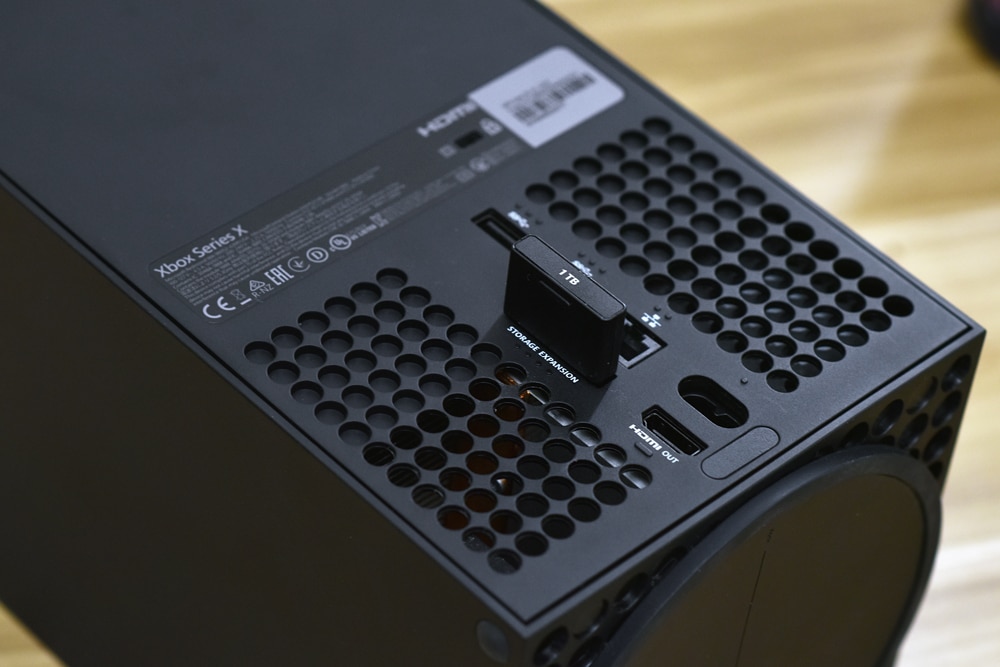
Seagate Storage Expansion Card for Xbox Series X|S Management
The card comes preformatted for the Xbox Series X|S but there are management options as well. Inserting the drive shows that it comes up as a 920GB storage expansion card. Users can choose between the two devices for more options.
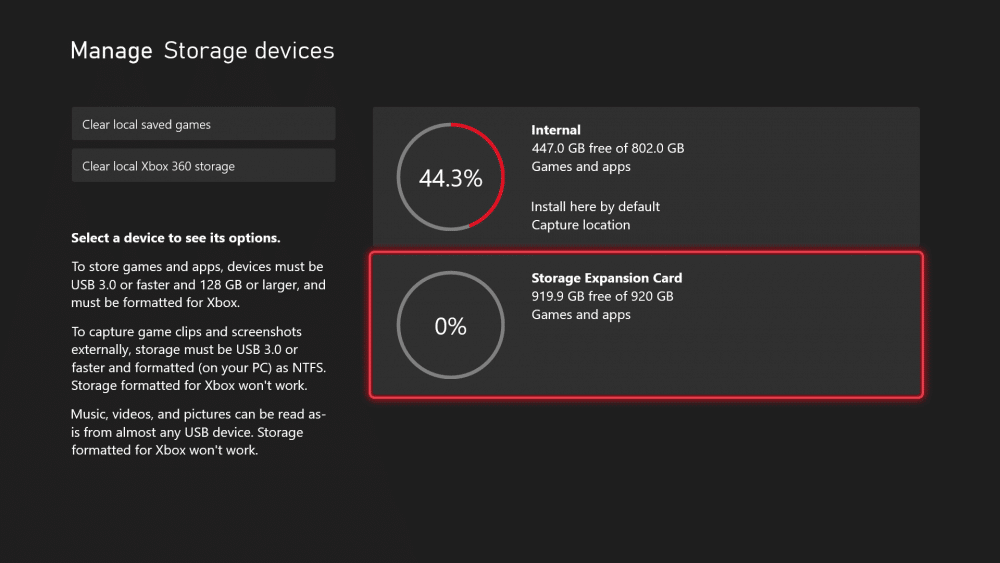
Once chosen, users have the option of seeing the contents of the card, installing games to the card by default, moving or copying games to the card, uninstalling items, renaming or formatting the card, or setting it as a capture location.
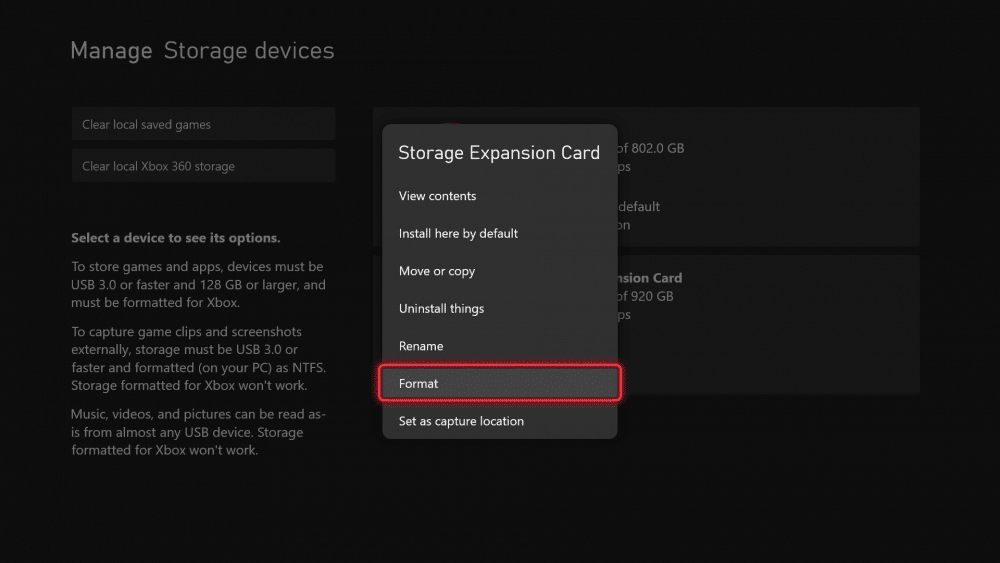
Since a CFExpress card fits in the port, we would be remiss in our duty if we didn’t at least try. But, alas, the console doesn’t support just any CFExpress card.
Seagate Storage Expansion Card for Xbox Series X|S Performance
To test performance, we used a dual card Sonnet reader connected to a Lenovo X1 Extreme. We looked at both Blackmagic and IOMeter. Blackmagic saw the card hit 738.4.MB/s read and 308.1MB/s write. A little lower than what one would expect with a CFExpress device.
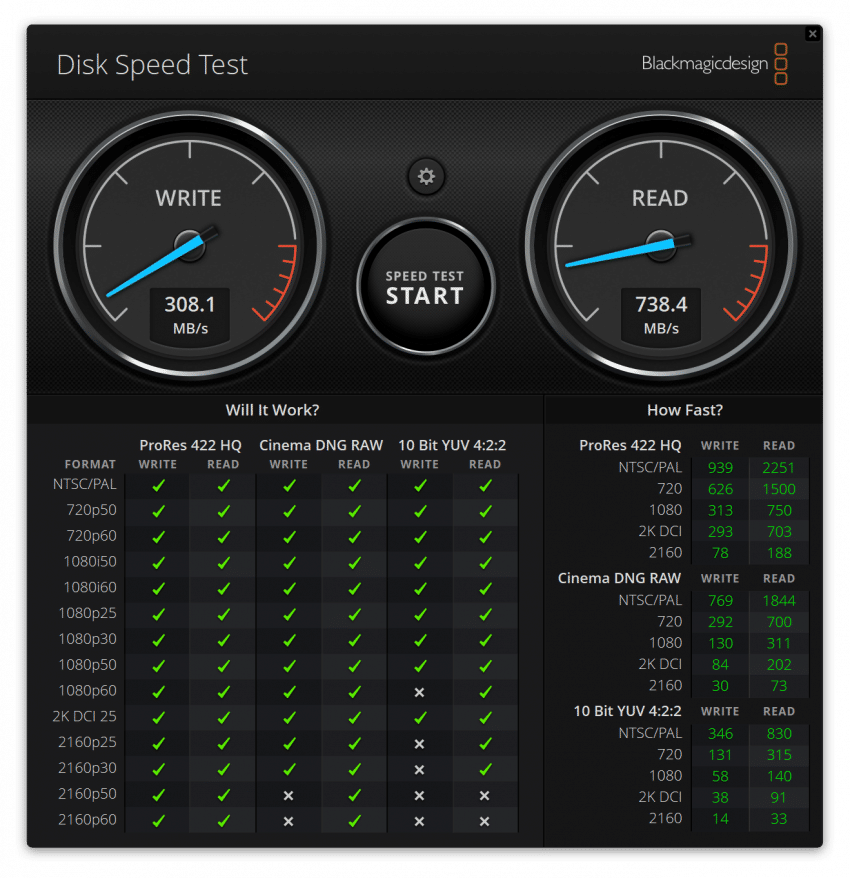
With IOMeter we used both 1 and 4 thread, the latter which is a higher load that pushes the drive a bit more. In 1 thread our 2MB sequential saw 747.1MB/s read and 194MB/s write. 2MB random saw 647.4MB/s read and 193.7MB/s write. 4K random had a throughput of 12,590 IOPS read and 148 IOPS write.
Looking at a 4-thread workload, for 2MB sequential the card hit 820MB/s read and 664MB/s write. 2MB random had the card going up to 818MB/s read and 658MB/s write. With 4K random throughput, we saw 30,219 IOPS read and 684 IOPS write.
Conclusion
The Seagate Storage Expansion Card for Xbox Series X|S allows users to double or more than double their console capacity while maintaining performance. This small form factor card adds 1TB of capacity and leverages PCIe Gen4 technology to let gamers get the most out of their games. For non-optimized games, Seagate offers their Game Drive for Xbox and SSD for Xbox.
Currently, this is the only game in town as far as NVMe-native expandable capacity for the Xbox Series X|S so there is nothing else to compare it to. The closest would be a “traditional” USB 3.1 connected SSD, which the previous generation Xbox could take advantage of as well. The main advantage the CFExpress-based Seagate Storage Expansion Card offers is it comes in a smaller form factor and is the main recommended storage expansion offering on the market for the new Xbox. The downside of course is cost, but even then it is easily the most cost-effective CFExpress card on the market today. Around $200 dollars nets you this 1TB product, but if you look at the CFExpress card market, that amount would only get you a 128GB product. The 1TB models generally float upwards of $800. The main difference of course is performance, where the CFExpress models in that market segment offer much higher read and write performance, all at a much higher price.
We ran Blackmagic and IOMeter to get some numbers out of the card. In Blackmagic the card hit 738.4MB/s read and 308.1MB/s write. In IOMeter the card had 1 thread 2MB scores of 47.1MB/s read and 194MB/s write sequential and 647.4MB/s read and 193.7MB/s write random. 4K throughput in 4 thread hit 12,590 IOPS read and 148 IOPS write. In 4 thread, 2MB hit 820MB/s read and 664MB/s write sequential and 818MB/s read and 658MB/s write random. 4K random 4 thread gave us 30,219 IOPS read and 684 IOPS write. 4K random write numbers stand out as pretty low, but for the type of activity this card is designed for, that metric doesn’t really come into play.
As far as how this translates into gameplay, users will see no real difference in loading games off of the card versus using the internal drive, which is the main draw. The only real downside upfront is the lack of capacity. For instance, I have about 9TB worth of games on external storage on my Xbox One. With an Xbox Series X, even with the expansion card, I would have to triage which games to keep and which to delete and redownload later. Though this isn’t really an issue with the card itself, and older external storage can still be leveraged for legacy games and the new games can be stored on USB 3.1 devices though play from them may be sluggish.
While it is a bit pricey at $220, it is good to get out first. The Seagate Storage Expansion Card for Xbox Series X|S is the only option for expanding capacity on the current generation Xbox consoles (for the latest games, anyway) but doesn’t skimp on performance or capacity.
Seagate Storage Expansion Card for Xbox Series X|S on Amazon
Engage with StorageReview
Newsletter | YouTube | Podcast iTunes/Spotify | Instagram | Twitter | Facebook | RSS Feed

